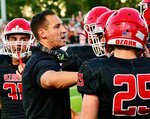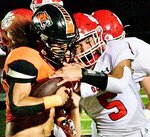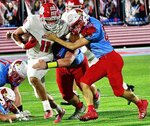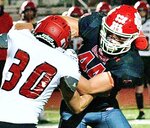




Sports Editor Pat Dailey engaged in a Q’s and A’s session with Ozark coach Jeremy Cordell to reflect on his first season with the Tigers and the program’s future:
Q: Now that you’ve been six months on the job at Ozark, what are your overall feelings?
Cordell: I’m grateful and thankful for the program. In your first year, you always have to assess, evaluate and get to know people and their families and operations. There's a lot that goes into your first year. Having that background now, I feel so much better going into year two. I’m not going to be learning names in June.
With all that being said, we jumped right in. We attacked it from seven hours away in the spring (while still in Illinois) the best we could.
On top of all that, we had an inexperienced lineup, so we were starting fresh in a lot of different areas.
Q: Let’s start with your seniors. What did you think of your first senior class at Ozark?
Cordell: I appreciate those guys, the buy-in they had and their effort along the way. You flip perspectives and they had a new coach coming in and a whole new, different way of doing things and they've only got several months to figure that out. Kudos to those guys for the sacrifices they made and helping to establish where we're going to be moving forward.
Frankie (Munoz) had a fantastic year at linebacker.
Jack Bowers had a lot of great games for us. He had a heck of a Week One.
Jrayen (Jenkins) had an outstanding year. He's a gritty player who played well up front. On special teams, he would run downfield and make open-field tackles on kickoffs and punts. He worked at it, committed to it and had a nice year.
Johnny Williams' stats were really good for the games he played in. He played against CJ and was lights out with some big tackles and a sack. He was a presence. Then we lost him for four weeks. He came back and didn't miss a beat.
Charles Lawson was a jayvee player last year who was a huge presence at our Sam-linebacker this year. He had a ton of tackles. He's a hard-nosed, gritty kid.
JP Phillips and Nick Guse got touches (at wide receiver). They were two guys who had never played football before.
I'm thankful for the seniors. They helped create a legacy of where we’re going. They can be proud of that.
Q: What did it mean to kick off the season with a victory at Carl Junction?
Cordell: To figure the pieces out and come out in Game One and have a win on the road at CJ, that was big for our program. It was kind of like re-booting and re-starting. It was awesome to come out of the gates that way and then to come back home in Week Two, we were fired up and ready to go. We held close with a really good opponent in Republic for about a half.
Q: Injuries, of course, started in Week One and continued to mount throughout the season. Some of the key losses were tight end Jace Whatley and offensive lineman Logan Smith. How did the number of injuries compare to what you have experienced in past seasons?
Cordell: From what I've been used to in my career, there were more. All of them seemed to be lower-body and non-hamstring injuries. So, I feel good about what we do to prevent (injuries). We do a lot of training to prevent them. It's hard to put a finger on it. You could have the debate of grass-turf and this and that. You can't control them, and do the best you can.
Jace brought a big (asset) to our offense as a blocker and receiver. He really had a good summer. We would have probably slowly moved him into roles on defense. I feel bad anytime a player has a short season. He's going to go on and do great things. But as far as the immediacy of it and with it being his senior year, you never want to see a player go through that.
Logan was a big loss. He was a big impact on the offensive line, kind of like a rock or the glue. He's a solid player. It tells a lot about Logan that even after he was injured, he continued to help out the offensive line.
Q: Quarterback Peyton Russell rates as perhaps your most pleasant surprise this year. He went from anonymous during 7-on-7 sessions to your starting QB for Week One. What are your thoughts on his ascension as a sophomore?
Cordell: I'm proud of him. A lot of times you have that first varsity start and you're a junior or a senior. He was a sophomore thrown in there. First game, it looked like he had been our starter for two or three years. He's a calm presence, just like his demeanor. He's calm, but a fiery competitor.
Like any good athlete, he knows his parameters. He knows the things he should be doing and shouldn't be doing. As far as staying with the game plan, he always did a good job of that. A 66-percent completion percentage for a sophomore quarterback, that's pretty darn good. He's a good decision-maker. He has a lot of room to grow. We all do.
I think about him and his progression and the Waynesville game. When we drove the field to kick the winning field goal, a lot of that was on Peyton's plate.
Q: When did Russell make your radar, as far as a potential starter?
Cordell: From an assessment standpoint, the first time I saw him throw, I remember thinking, 'He's got a good, little stroke to him.' Looking through a coach's eyes, there were things you wanted to help him out with and so forth. But I saw that he had some potential and good physical attributes.
Once he started gaining confidence, he got better and better. It was beyond clear he was our guy.
Q: Another big move was changing Sam Clark from a cornerback to a wide receiver. Clark responded with 57 catches. What did you think of how he handled his transition?
Cordell: We had a need to use his athleticism on the offensive side, especially being a team that throws the ball now more than they did in the past here. He stepped right in. For him to go out and learn the offensive scheme, route-running and blocking, he really did a fantastic job.
Q: Russell and Clark were among a slew of underclassmen to emerge as starters. What did you think of your youth movement?
Cordell: Our whole lineup, outside of a few seniors, offensively and defensively was juniors, sophomores and a couple freshmen.
On our defensive line we have Ruben Arvizu, JT Cordell, Quinten Combs and Landon Baldwin. They saw the bulk of time. All of them are juniors. They owned it up front.
In the middle, you had Parker Elliott, Jordan Giles and Taygen Scott. Parker had an absolute monster year with 136 tackles.
Our secondary was all juniors with Marcus Heavin, Peyton Bullinger and Sam Clark.
We had a primarily junior offensive line.
in the backfield, Rory Banks was a guy who came in and stepped up as a sophomore. He had some really good games.
I'm grateful for all of them to have gained experience. It's only going to help us down the road. With any young player, you just want to see them progress and there was so much progress that was made.
We’ll be bringing back a ton of players. We have established the groundwork. I'm excited to continue developing players, culture, relationships and all the things that are important and lead to future success.
Q: You even had a couple freshmen, Jett Easley and Anthony Cordell, receive some spot duty as wide receivers and on special teams. What do you think of their future?
Cordell: They definitely have the raw tools. It's not ideal when you're competing under Friday night lights to play freshmen, but there is some return to that. The bottom line is, they earned it. They were not out of place by any stretch. As they progressed, we felt we had to get those guys some touches. Jett ended up having a dozen catches and made some big plays against Waynesville. Anthony was our second-leading (kick) returner. It was good for those guys to get action.
There is no doubt as far as their stature and where they are now, they're on the smaller side. But for what they lack in size, they're both tough players, have some quicks about them and are multi-sport athletes. They compete in different arenas, so they're constantly going to be pushed. They're going to maximize who they are with their work ethic, effort and attitude.
Q: After losing eight in a row to close out the regular-season slate, what did it mean to gain a win at Waynesville at the start of Districts?
Cordell: We definitely had ups and downs through the season. I was so proud that here we were in Week 10 and our guys were working their tails off in practice, harder than they'd worked all year. You look at the record and a lot of teams might have folded. Kids might have said, 'We're done with this,' or 'We didn't have the success we wanted, why do we have to practice hard?' But our guys were practicing harder than ever and were more focused than ever.
Then, we went out and got a nice playoff win. That showed a lot of which direction we're headed in, their belief and buy-in.
Winning is a mindset — you prepare to win in every situation you encounter. That was the mindset we had all year. That’s our eternal motivation and eternal message. We don't care what outsiders or naysayers say. We kept plugging away and found a way to get better.
Q: Going back to last summer, how was the team’s three-days, two-nights mini camp at Pitt State (Kansas)?
Cordell: It was great to have that camaraderie, coming together for a common goal and young men working through things. We're in it together. It's not easy. It's not like we're sitting by a pool playing video games.
It’s something I've done in my 14 years as head coach at the end of our summer contact days and something we will always do. In Illinois, we went to Ripon College in Wisconsin, the University of Dubuque (Iowa) and Monmouth College (Illinois).
I've seen so many things come out of those camps. When we come back in August, we know what our vision is. We see so much value in it. Coaches get a chance to grow as coaches. I learn something new every time, about myself or the players or other coaches.
Q: Can you explain why you had your team start a tradition by acknowledging the student section after games?
Cordell: That’s something we've always done in our programs. My feeling is, you are playing for love of the game and your teammates and coaches, but it's more than that. It's about your family and school community. For the school community to be fired up and give the support they showed us, it's our duty win, lose or draw as players and coaches to show our appreciation. That's always our first order of business, go over to the student section and thank them for being here.
Q: Offensive coordinator Justin Peery made his play-calling from the sideline this year, after calling from the press box in the past. How did that go?
Cordell: It was his preference to call from the field and it was a good chance for us to be able to interact and not just talk over the headset.
Q: Is your coaching staff staying intact or will you have some changes?
Cordell: The majority of them are coming back. But, just like any program that evolves and moves forward, there are going to be additions and subtractions. That's the nature of programs. My philosophy every year is, I'm looking to fill the best staff possible for our kids. I want the best human beings and coaches surrounding our kids. I'm always looking for coaches who want to be part of a mission and want to be part of a journey.
Q: What do you think of the future addition of two multi-purpose indoor facilities being constructed adjacent to the football field?
Cordell: It’s going to be an absolute game-changer, having two extra spaces to utilize for our kids and not just in football. Having other options is going to be phenomenal. I feel so grateful for that availability, and I know our kids and parents are excited, as well.
In any program, there are things you look at and think, 'We need to have these resources.' There are some things we needed to do immediately. What are the needs that are going to make our kids better? I think back to our intense heat days we had the first days of August. Some teams that have indoor facilities could practice indoors and not miss a beat. We had to go off site and bussed to Springfield to have an indoor practice.
Q: What has your experience with strength and conditioning coaching Corey Roy been like?
Cordell: Coach Roy is fantastic. I work with him during the school day. We team-teach together. My background is strength and conditioning, as well. Just to have another guy like that to take ownership, it's been nice to take some of that off of my plate. We're of the same mindset. Our training background is of the same nature and our beliefs and philosophies are very much aligned. He's a great guy who cares about our kids and works them hard. To me, he's a coach in the program without being on the field. He's an extension of our program.
Q: What does it mean to have your players make favorable impressions near and far in regards to their character?
Cordell: Our guys no doubt are gentlemen. That comes a lot from their homes. We have great families that have high expectations for their children. That is a huge part of what we are. We talk about being 1-0 on and off the field all the time. It's woven in everything we do.
We expect our kids to tie the line in the classroom and hallways. There are consequences when they don't and incentives when they do. You're always grateful for what you have. We're not the program we want to be if we're not grateful for what we have. It's a direct reflection of who they are.
Q: How interested are you in learning about Ozark’s history on the gridiron?
Cordell: I think that's super important. You've got to know where you came from and what that looked like. Ozark is a tight-knit community. I have coaches on my staff who played for Ozark. I hear their stories and other people's stories who played here. I hear from community members whose kids might have played here and they want to see us succeed. To me, it gives you a big picture of where you want to go, what it looks like and how you want to make our community proud. I love learning about all our past.
Q: What did you think about your first go-around through the COC?
Cordell: Great conference, no doubt about it. Top to bottom, super competitive with great coaches and solid communities that back their football. I came from a highly competitive conference, so it wasn't a shock. Some styles of play are different. I'd say there is more ground-and-pound here and a little more spread-out systems in Chicago.
Q: What is your relationship with AD Yancey Little like?
Cordell: Him and I are very aligned with our vision and where we want this place to go. He is a big supporter of us. We talk openly about where do we want to go and what does this look like. He's very approachable. There's nothing I'd rather do than help us have success for the time he has remaining here. He always says he wants to leave this place better than where he found it when he stepped in. That's my goal, to help him with that.
Q: What are some off-season plans?
Cordell: Football is a big operation. You start going through all of the end of the year stuff, like turning in all of the equipment and winterizing things. We are working through end of the year interviews and exit interviews. Our position coaches will do that and I will meet with every coach.
We're planning awards (for the awards banquet) in the next couple of weeks.
The Wednesday we come back after Thanksgiving, we will have a pre-season meeting for next year for our returning guys and kids who are coming out for the first time on what we're going to do in the off-season.
To have the opportunity for development over the next several months, I'm excited about. We're very incentive-based and we hold kids accountable, as well.
Q: What are you looking forward to most in your second year on the job here?
Cordell: Going into year two, the familiarity. We're not going to have to put it all together real quick, like we had to in the summer. We will be able to have a full off-season, do our leadership training, offer incentives and create benchmarks. I'm really looking forward to that and different things we want to incorporate. Kids know our program now and the direction we're going. You see things take on a life.